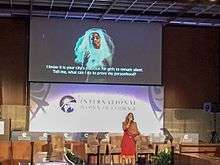Sonita Alizadeh
Sonita Alizadeh (Persian: سونیتا علیزاده; born 1996)[1] is an Afghan rapper and activist who has been vocal against forced marriages. Alizadeh first gained attention when she released "Brides for Sale," a video in which she raps about daughters being sold into marriage by their families. With the help of Rokhsareh Ghaem Maghami, an Iranian documentary filmmaker who over three years documented her story in the film Sonita, Alizadeh filmed the video to escape a marriage her parents were planning for her, even though it is illegal for women to sing publicly in Iran, where she was living at the time.[2] After releasing the video on YouTube, Alizadeh was contacted by the Strongheart Group, which offered her a student visa and financial help to come and study in the United States of America, where she then relocated and has resided since.[3] In 2015, she was listed as one of BBC's 100 Women.[4]
Sonita Alizadeh | |
|---|---|
سونیتا علیزاده | |
| Born | 1996 (age 23–24) Herat, Afghanistan |
| Nationality | Afghan |
| Other names | Sonita |
| Occupation | Rapper |
| Years active | 2014–present |
| Known for | Rapping for Afghan women's rights |

Early life
Alizadeh grew up in Herat, Afghanistan, under the rule of the Taliban. Her family first considered selling her as a bride when she was 10. Alizadeh has said that at the time, she didn't fully understand what that meant.[5] Instead, her family fled to Iran to escape the Taliban. In Iran, Alizadeh worked cleaning bathrooms, while she taught herself to read and write. During this time, she also discovered the music of Iranian rapper Yas and American rapper Eminem. Inspired by their music, she started writing her own songs. In 2014, Alizadeh entered a U.S. competition to write a song to get Afghan people to vote in their elections. She won a $1,000 prize, which Alizadeh sent to her mother, who had moved back to Afghanistan.[3]
"Brides for Sale"
Shortly after winning the competition, Alizadeh's mother sent for her to return to Afghanistan, saying she had found a man to buy her. She was 16.[5] Her mother was trying to earn a $9,000 dowry so that her elder brother could purchase a bride, and thought she could get at least $9,000 by selling her daughter. After Rokhsareh Ghaemmaghami, director of the documentary Sonita, paid $2,000 to Sonita's mother and asked for six months of time for Sonita, she wrote "Brides for Sale" and Rokhsareh Ghaem Maghami filmed the music video, which gained international attention. The video was not only popular with women in Afghanistan, but also drew the attention of the nonprofit Strongheart Group, which arranged to bring Alizadeh to the U.S.[3]
Present
Alizadeh currently lives in New York and attends Bard College. In addition to attending classes, she continues to write songs. A documentary, called Sonita, premiered at the International Documentary Filmfestival Amsterdam in November 2015.[5]
The film gained positive reviews.[6] The film was entered into the Sundance Film Festival and won the World Cinema Grand Jury Prize for a documentary film.[7] The film also showed at the Seattle International Film Festival in 2016, and Seattle alt-weekly The Stranger designated it a "don't miss" feature.[8]
References
- "Sonita Alizadeh: le rap comme rempart au mariage forcé". visionsmag.com (in French). Retrieved 3 August 2019.
- Marusic, Kristina (October 12, 2015). "This Afghan Teen Escaped Forced Marriage By Making a Rap Video". MTV. Retrieved October 23, 2015.
- Bloom, Deborah (October 12, 2015). "Afghan teen uses rap to escape forced marriage". CNN. Retrieved October 23, 2015.
- "BBC 100 Women 2015: Who is on the list?". BBC News. 17 November 2015. Retrieved 3 August 2019.
- Wainwright, Robert (October 8, 2015). "Afghan teen rapper was 10 when her mother first considered selling her". The New York Times. Retrieved October 23, 2015.
- 'Sonita': IDFA Review
- "Sonita". sundance.org. Sundance Institute. Retrieved 4 September 2019.
- "Sonita". The Stranger. Retrieved 4 September 2019.